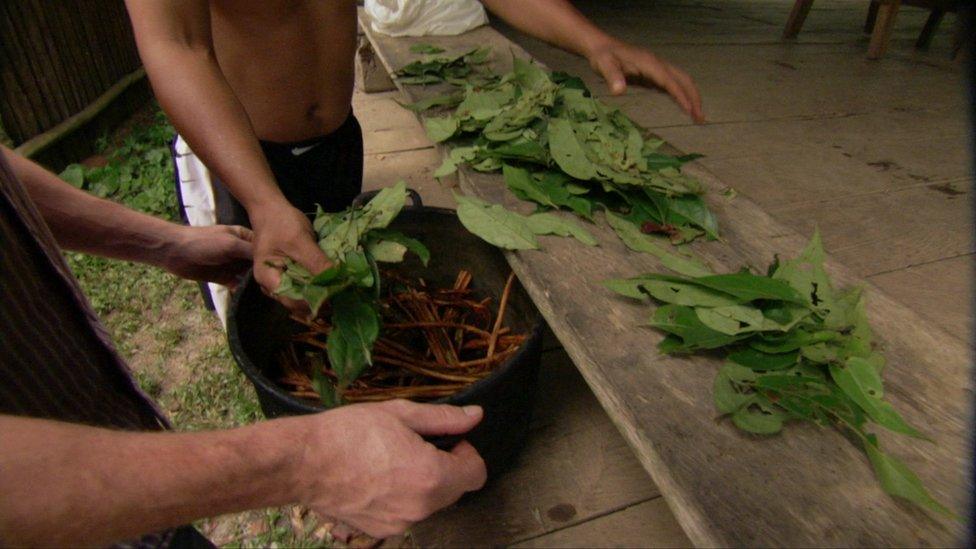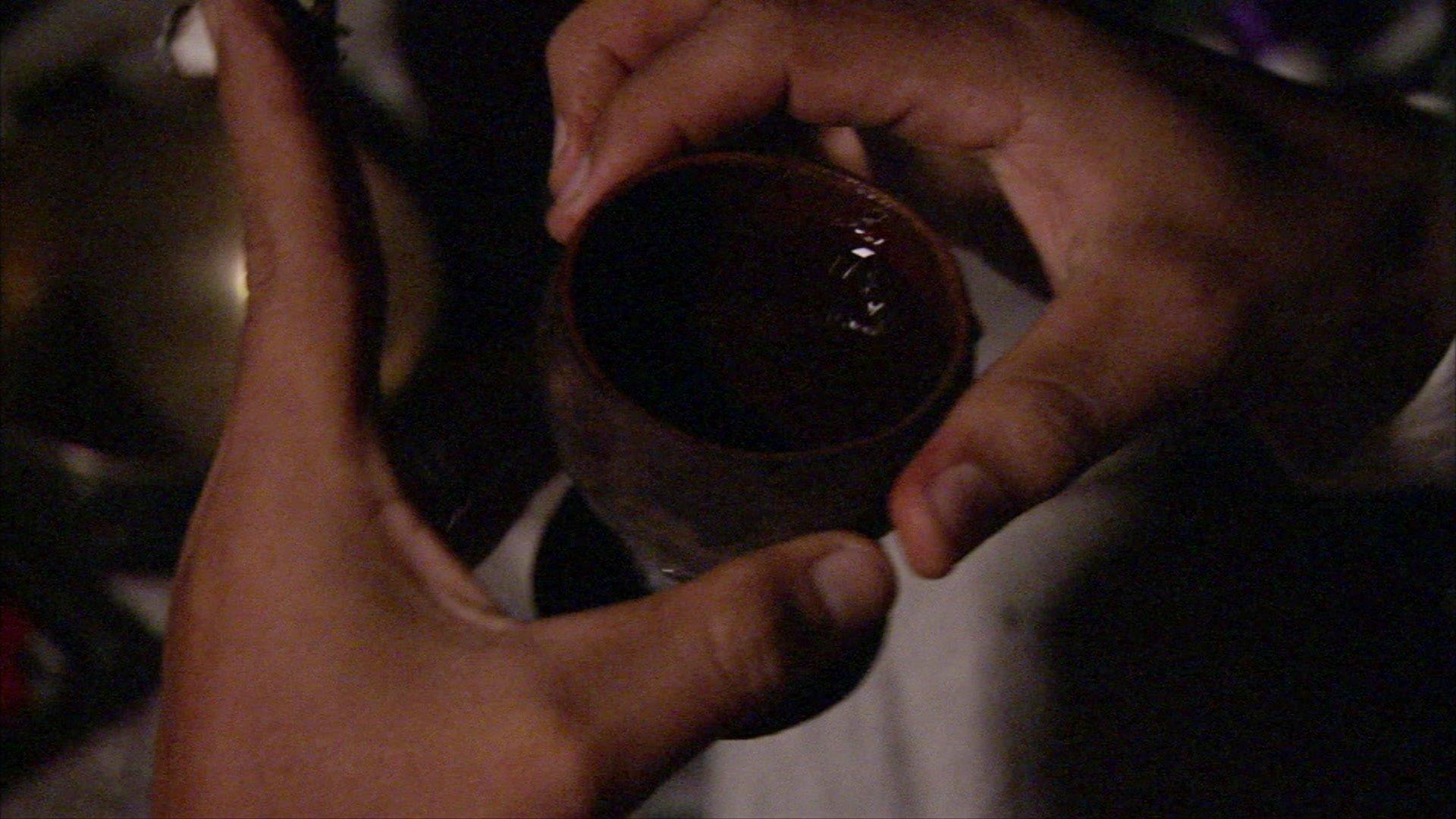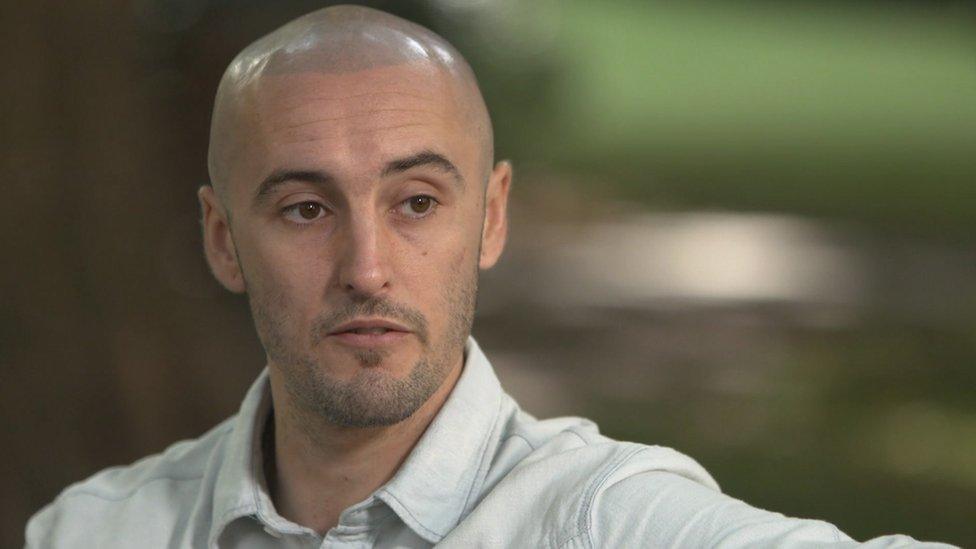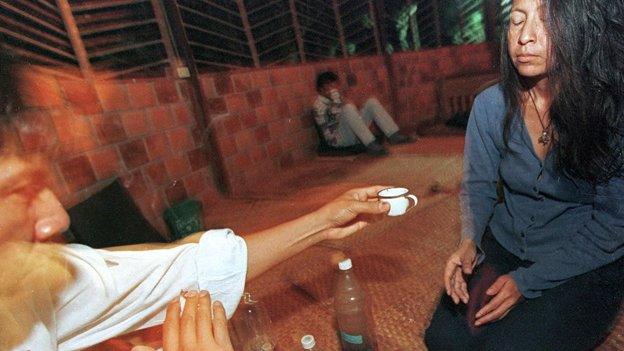Could psychedelic drug ayahuasca have health benefits?
- Published

Ayahuasca is a potent hallucinogenic brew that has been used by shamans, or healers, in the Amazon for centuries for medical and spiritual purposes.
It is one of the strongest psychedelic drugs in the world, and its use has been spreading from South America to Europe. Many experts say ayahuasca is dangerous, and it is illegal in the UK, but one doctor says it should be researched as a treatment for mental health issues.
After undergoing traditional therapy over a number of years, Jonathan Gold found out about ayahuasca online, reading that it "could be like 10 years of therapy in one night".
He travelled to a rural part of the Netherlands for a ceremony where he drank a very small amount the drug, resulting in a "trip" that lasted about eight hours.
"The ceremony is like this epic, eight-hour journey, it really is a journey," he tells the BBC's Victoria Derbyshire programme.
"It was like night and day... a dramatic change that I would notice on a daily basis. If we say my self-esteem before the ceremony was at 10%, after the ceremony it was 90-100%. It really was that dramatic."
Experts, however, believe taking drugs at retreats is dangerous.
Harry Shapiro, director of the online drug information service DrugWise, says: "People are naively going off and taking a very strong drug."
Some people have had terrifying experiences and violent reactions.
And Mr Shapiro says: "There is no support there if it goes wrong."
Backpackers' drug
Ayahuasca is a potent hallucinogenic brew that has been used by shamans, or healers, in the Amazon for centuries for medical and spiritual purposes.
Many backpackers have taken it while in South America over the past few decades, but there are now growing number of ayahuasca ceremonies being conducted in Europe.

Taking ayahuasca is illegal in the UK
Ayahuasca, also known as yage, is a blend of two plants - the ayahuasca vine (Banisteriopsis caapi) and a shrub called chacruna (Psychotria viridis), which contains the hallucinogenic drug dimethyltryptamine (DMT). DMT - and therefore ayahuasca - is illegal in the UK, the US and many other countries.
It could have serious implications for anybody who has a history of mental health problems, warns the Talk To Frank website. It says the drug could also be responsible for triggering issues in those who are predisposed to mental health problems but unaware of the fact.
When David Rees and his friend Sam took the drug in 2014, Sam spent the whole experience laughing.
"On the surface he was cool, had his act together, all he did was talk about what a great time he had. There was no sign anything was wrong," David says.

David Rees believes his friend killed himself because he had taken ayahuasca
But he believes Sam had opened Pandora's box by taking the drug.
"It brought to the surface things he'd been carrying his whole life and he didn't have the support to deal with it and integrate this emotion into his life. And I think that's why he decided to kill himself," he says.
Despite such dangers, one addiction psychiatrist and psychopharmacology researcher is calling for ayahuasca to be investigated as a possible treatment for conditions such as depression and post-traumatic stress disorder (PTSD) - under strict controls.
"If we can show it works and can be used safely, it's absolutely ethical we develop it for medicine," says Dr Ben Sessa - who is not advocating taking the drug on a retreat.
"We need to find a way to make these as safe as possible because to throw the baby out with the bathwater and say they have no uses unless they're 100% safe is just not good science."
Spirituality
Dr Bia Labate, one of the world's leading ayahuasca experts, agrees there is lots of potential and anecdotal evidence for its use in medicine.
"There are currently 80 subjects in a clinical trial in Brazil looking at its impact on people with depression - it's very rigorous and very promising. In Brazil it has helped people with depression who have been resistant to other treatments," she says.
But she adds that medicinal benefits are not the drug's only "mission". "There is a cultural, religious and spiritual use, which is the most important thing. A path for people interested in personal growth and spirituality, and that's where I think it has the strongest appeal".
Dr Christos Dimitriou, a consultant psychiatrist who specialises in depression and PTSD, says the most important thing is for people in distress to be assessed by professionals and given a tailored treatment plan, not try to solve it themselves on a retreat.
He says ayahuasca still needs "huge amounts" of research. "There is a lot of work being done with MDMA [methylenedioxymethamphetamine] for PTSD and ketamine for depression. It's a long process before something is ready that a doctor can use with confidence in specific amounts. We are light years away from ayahuasca being in that category."
'Naively experimenting'
Harry Shapiro from DrugWise says he is most concerned about people taking the drug at retreats in Europe - as there is no guarantee they won't have a bad experience.
"Proper clinical trials to see if there is a genuine medical benefit are fine. These proper cultural ceremonies are fine. But I am doubtful whether this kind of drug tourism is a good idea. There's no support there if it goes wrong," he says.
"People are naively going off and taking a very strong drug. You should do your research before you head off to a weekend retreat in the country and start experimenting."
Watch the Victoria Derbyshire programme on weekdays between 09:00 and 11:00 on BBC Two and the BBC News channel.
- Published29 April 2014
